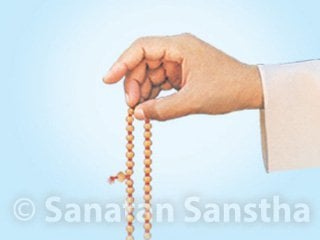 |
Contents
- 1. Definition of Path of Chanting The Lord’s Name (Namasankirtanyoga)
- 2. Misconcepts
- 3. Special features
- 4. The principle
- 5. How does ‘Chanting’ work?
1. Definition of Path of Chanting The Lord’s Name (Namasankirtanyoga)
The word ‘japa’ is derived as follows: ‘जकारो जन्म विच्छेदक: पकारो पापनाशक: ।’- that which destroys sins and liberates one from the cycles of birth and death. Japa (chanting) means repetition of some letter, word, mantra or sentence. Namajapa means repetition of The Lord’s Name. In other words, it means chanting of The Lord’s Name (Namasmaran). Mantrajapa refers to the repetition of a particular mantra. This path of spiritual practice is called Namasankirtanyoga (Path of Chanting The Lord’s Name). Sankirtan means singing the praises, glory or chanting the Name of The Lord.
Synonyms: Namasmaran, Nam and Namajapa.
2. Misconcepts
A common misconcept is that one acquires certain benefits on completion of certain crores of chanting (japa), for instance according to astrology, purification of one house in the horoscope occurs with each crore of chanting, repayment of debts after two crores of chanting and marriage on the completion of seven crores. We have seen many people who acquired neither worldly nor spiritual benefits inspite of doing ten to fifteen crores of chanting; as the Name they were chanting was either inappropriate or was not prescribed by an authority in Spirituality.
3. Special features
- A. ‘The Lord’s Name is superior to the Vedas because the Vedas have originated from the Name (from Omkar). Hence the study of the Name (chanting) is of greater importance than the study of the Vedas, Upanishads, Gita, etc.’ – Saint Bhaktaraj
- B. ‘The Lord’s Name is superior to His form’ – Hari Om Bagve. The form is associated with the tej (absolute fire) element while the Name (that is its sound) with the akash (absolute ether) element.
- C. The monkeys chanted Lord Ramachandra’s Name while tossing boulders into the ocean and built a bridge across it. The boulders floated as a result of the chanting. However, when Lord Ramachandra Himself threw a boulder, it sank. Hence it is said, ‘Rama’s Name is mightier than Rama Himself’.
- D. The span of The Lord’s Name (the principle in the Name) is vaster than the akash (absolute ether) element.
- E. ‘The Lord’s Name is both the means as well as the end.’ – Saint Bhaktaraj The implied meaning: When chanting requires to be done effortfully it is the means (spiritual practice). When it occurs automatically and continuously, it is the end.
- F. Although The Supreme God is unmanifest, His Name is not. Hence, one can find Him with the help of His Name.
- G. ‘The Lord’s Name itself is the Guru. Devotion unto The Lord’s Name is itself the Guru’s energy.’ – Saint Bhaktaraj
- H. Pronunciation is unimportant unlike the Vedas: When reciting the Vedas it is essential to pronounce the words correctly. Faulty pronunciation can prove to be harmful. The Panini school of grammar preaches, ‘अनक्षरं हतायुष्यं विस्वरं व्याधिपीडितम् ।’ which means that if the consonants in the Vedic words are not properly pronounced, it results in shortening of the life span and if the vowels are pronounced discordantly one gets afflicted with ailments. However, this does not apply to chanting of The Lord’s Name. Even if pronounced incorrectly it destroys one’s sins. A verse (shloka) from the Pancharatragam in this context says,
मूर्खो वदति विष्णाय बुधो वदति विष्णवे ।
नम इत्येवमर्थ च व्दयोरपि समं फलम् ।।The meaning: The foolish man incorrectly utters, ‘Vishnaya namaha (विष्णाय नम:)’ while the scholar correctly pronounces ‘Vishnave namaha (विष्णवे नम:).’ But since the motive of both is the same, to worship The Almighty, they are both blessed equally.
- I. Occurrence of contemplation (smaran) and meditation (dhyan): Contemplation and meditation too, can occur with chanting of The Lord’s Name. In this context, Shri Shankaracharya in His commentary on the Vishnusahasranam says,
मनसा वा अग्रे सङ्कल्पयत्यथ वाचा व्याहरति ।
यद्धि मनसा ध्यायति तव्दाचा वदति ।
इति श्रुतिभ्यां स्मरणं ध्यानं च नामसङ्कीर्तनेऽन्तर्भूतम् ।।The meaning: First, man makes a resolve mentally or meditates and then speaks what one has meditated upon in one’s mind. Both these quotes from the Shruti show that contemplation (smaran) and meditation (dhyan) are incorporated in chanting of The Lord’s Name.
- J. Perfection of spiritual practice: Chanting The Lord’s Name is essential in order to obtain the benefit of performing a Vedic ritual and to nullify the errors committed when performing it. Hence it is advised that one should contemplate on Lord Vishnu when concluding any ritual. However, for the accomplishment of chanting The Lord’s Name no ritual is required.
- K. Benefit even in the absence of faith: The Gita (17.28) says that ritualistic actions like sacrificial fires (hom), donations (dan), penance (tapa), etc. done without faith are not fruitful. According to the Narad Puran however, chanting performed even without faith proves to be fruitful and when performed with faith proves to be more beneficial.
अश्रद्धयापि यन्नाम्नि कीर्तितेऽथ स्मृतेऽपि वा ।
विमुक्त: पातकैर्मर्त्यो लभते पदमव्ययम् ।।
संसारघोरकान्तारदावाग्निर्मधुसूदन: ।
स्मरतां सर्वपापानि नाशयत्याशुसत्तम: ।।The meaning: ‘Man can attain the eternal abode by being purified of his sins, chanting The Lord’s Name even without faith. Shri Hari (The Lord) is akin to the devastating fire of the dense forest of this worldly life. The Supreme Being (Purushottam) destroys every sin of the one who chants His Name.’ (1)
A seeker in the primary state does not have faith in the Name. Hence,‘Benefit even in the absence of faith’ is intended for him, so that he chants. However if one chants without belief, spiritual emotion and faith then the benefits derived are less than those obtained if the chanting is performed along with them. Hence it is said that belief, faith and spiritual emotion are necessary.
- L. Beyond restrictions: ‘Sacrificial fires (yadnyas), donations (dan), ritualistic bathing (snan), incantation (japa) are done at an auspicious time. But chanting is beyond the restrictions of time and space, purity or seclusion during worship.
- M. Essential even for a person with spiritual knowledge (dnyani): Just as The Lord’s Name imparts spiritual knowledge (dnyan) to one desirous of Liberation (mumukshu) or a seeker, it also perfects the knowledge of a spiritually knowledgeable person (dnyani). Spiritual knowledge is of two types – the immature direct experience (komal aparoksha) and the mature direct experience (drudha aparoksha). Once a seeker acquires indirect (paroksha) or verbal knowledge from a Guru and the scriptures, to convert it to direct experience he has to destroy defects such as ignorance (mala), distortion (vikshep), etc. from the subconscious mind. This is called the immature direct experience (komal aparoksha). Once such direct knowledge (aparoksha) is acquired, chanting is required once again, to strengthen it. This is called the mature direct experience (drudha aparoksha). Once such perfection is attained chanting becomes but a routine for that realised soul.’(2)
4. The principle
‘It is earnestly preached that one need not renounce the world and retire to the forest in search of God, in the Kaliyug. The world itself is not bad, as it is the creation of That Omnipotent Lord Himself. It is the attachment to the world that is bad. It is the root cause of bondage and the cycles of birth and death. Further, one has to digress from objects of attachment like the father, son, wealth, etc. and substitute them with The Omnipresent Supreme God as the focus of one’s attachment and this can easily be achieved by chanting The Lord’s Name.’(3)
5. How does ‘Chanting’ work?
‘The subconscious mind carries millions of impressions. To erase even a single impression would take a very long time. As such, a considerable period of time would be wasted in overcoming the tendencies of the subconscious mind, by following restraints and regulations (yam-niyam). It is much more important to make continual efforts to blend with The Absolute Being (Purush), rather than to try and erase such impressions from the mind which arise from Prakruti. This is precisely what can be achieved by chanting The Lord’s Name. The mind, intellect and subconscious mind (chitta) among others, are all constituents of Prakruti and these function according to their own characteristics. Instead of wasting one’s spiritual practice (sadhana) in resisting them, one would achieve one’s goal faster, if that spiritual practice is utilised to progress towards the God principle (Purushtattva) by becoming one with the “Name” (of God) that one chants.’
Reference:
‘Path of Chanting The Lord’s Name (Namasankirtanyoga) and Path of Mantra (Mantrayoga)’, published by Sanatan Sanstha.
Bharatiya Sanskrutikosh. Publishers: Pandit Mahadevshastri Joshi, Secretary, Bharatiya Sanskrutikosh Mandal, 410 Shanivar Peth, Pune 411 030.
Vol. 1 and 2: Second edition Vol. 3 to 10: First edition
1. Vol. 5, Pg. 34, 35
2. Vol. 5, Pg. 35, 363. Bhaktaraj Maharaj Shashthyabdi Smaranika. Page 33. Bhaktavatsalyashram, 102/1, Annapurna Road, Rajendra nagar, Indore (M.P.)

 Why do we chant Name of Kuladevi instead of Kuladev?
Why do we chant Name of Kuladevi instead of Kuladev? Remember this while performing the rites of cremation during calamitous times!
Remember this while performing the rites of cremation during calamitous times! Remedies for mental illness arising in an emergency
Remedies for mental illness arising in an emergency how to improve mental strength to face a terrible situation such as a riot
how to improve mental strength to face a terrible situation such as a riot Unique Spiritual experiences of Miss Smital Bhujle after chanting Om Namah Shivay
Unique Spiritual experiences of Miss Smital Bhujle after chanting Om Namah Shivay Do you know, Yogic postures and pranayam accompanied with chanting enhances its benefits!
Do you know, Yogic postures and pranayam accompanied with chanting enhances its benefits!